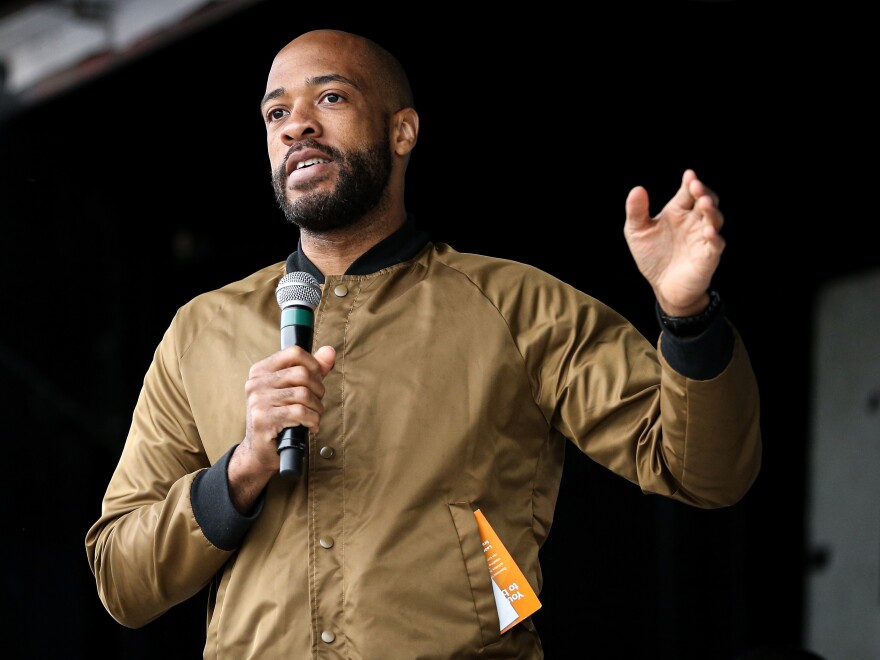June was a month marked by a lot of celebrations, including LGBTQ Pride Month, the Bucks’ historic playoff run and Juneteenth. But we also saw a rise in crime and the continuation of partisan battles in Wisconsin.
To unpack some of these issues, Wisconsin Lt. Gov. Mandela Barnes answers your questions.
In Milwaukee and around the country, we're seeing a rise in crime. At the same time, there are a lot of activists who want to defund or reform the police in a way that could shift money to other organizations. How do you respond to this rise in crime while considering the concerns over police brutality and misconduct?
"I would like to say that they're two separate things, because our police officers across the state, across the country aren't necessarily employed to prevent crime, right. Like they're in spaces in, you know, seen as a crime deterrent in many ways. But I think it's important for us to be more preventative in our approach. I think that's what it comes down to. I think that the lack of resources and education and activities and employment for people ... if we focus our attention in our efforts to improve the quality of life for people all across the state all across this country, we'd be much better off and crime wouldn't necessarily be an issue," Barnes says.
Do you believe defunding police departments by moving money to other services could prevent crime?
Barnes says, "Even for a person who doesn't want to go down the 'defund' rabbit hole, I think the same people would agree that we should probably have a little bit of parity in our spending. When it comes to social services, when it comes to libraries, when it comes to after school programs, when it comes to school funding — the problem is that lack of parity. There's this huge discrepancy in the amount of money and how easily it goes to police departments versus these other critical services that could ultimately save a person's life."
There's a huge disparity in who has broadband access in the state of Wisconsin and it's an issue in both rural and urban areas. What's being done to correct this disparity?
"It's an issue of opportunity," says Barnes. "Our state budget continues and doubles down on historic investments for broadband expansion. ... [This year's budget proposes] what will be largest investment broadband access in the state history with over three times as much as the as the previous budget. That's $150 million towards the expansion of broadband infrastructure and underserved areas, then another $40 million that will help low income Wisconsinites be able to afford internet service."
Do you mean the budget proposed by the Evers administration or the Legislature's proposed budget?
"That is the budget that the governor proposed. And there's also an allocation of $100 million in the American Rescue Plan Act funds for problem and access grants," he says.
The Legislature has been passing a lot of bills based on cultural issues, like a bill banning critical race theory from Wisconsin classrooms or the trans athlete bill. In response, the governor has chosen to veto these bills without much conversation. Is that the best way to deal with this or is there another way of working with the Legislature?
"Culture wars has been the way that Republican Party has operated for the ... last few decades," says Barnes. "It's not about moving the country forward. It's not about answering any particular issue, it's about capturing an electorate that is sort of finds itself stuck in a sort of thought that prevents them from being able to accept other people's humanity or other people's place in the world."
What does the future of historical education look like in Wisconsin, if teachers are unable to discuss race or critical race theories?
"If children aren't able to learn about how this nation came to be, whether it was slavery or whether it was the removal of Indigenous communities all across the country, then people won't understand why current struggles exist the way that they do today, people won't understand what the root cause of many of the disparities that we have," he says.
What are you and the governor doing to ensure Wisconsinites have the ability to make their voices heard at the ballot box?
Barnes says, "In our very first budget, we had automatic voter registration there. Unfortunately, Republicans took it out. But the fact is, the governor has the veto pen. And he has been very clear, very explicit in saying that any bill that makes it harder to vote that comes across his desk will be vetoed."
Can you and the governor ensure gerrymandering is not an issue as the new maps are drawn this year?
"There is a path forward and be honest with you, it's not an easy path forward," he says. "The governor did create the People's Maps Commission. ... The fact is, the Republicans will likely try to pass another gerrymandered map, one that will be somehow worse than the one we currently have. And with that being said, it's another issue of governor's veto pen, which we do expect to be using in this in this situation."
Have a question for Lt. Gov. Mandela Barnes? Submit it below.




